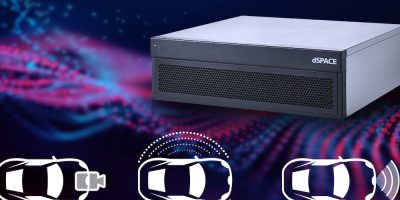dSpace provides multi-sensor testing for self-driving cars
The need for testing and validating self-driving cars is continuously increasing and placing ever higher demands on simulation performance, said dSpace. It has supplemented its simulation platform for realistic sensor simulation with the Sensor Simulation (SensorSim) PC HPP for realistic simulation of the vehicle environment and the physical sensor characteristics of ADAS/AD (advanced driver assistance systems / autonomous driving) functions. It provides power and efficiency for the fast and accurate calculation of physics-based models of radar, lidar, and camera sensors, said dSpace.
Based on the latest Intel Xeon Gold processors, SensorSim has the capability to equip the systems with up to two Nvidia graphics cards. According to dSpace, it is scalable and efficient for the fast and precise calculation of physics-based models of radar, lidar, and camera sensors. The dual-GPU operation and level of computational performance are also claimed to allow significantly more compact multi-sensor test set ups to be implemented than with previously available systems.
The SensorSim PC HPP enables deterministic real-time sensor simulation with realistic mapping and high resolution. It was developed for professional high-load testing (24/7) according to automotive reliability standards. The output of the simulation (e.g., 3D point cloud, target lists) can be used for data feed into both hardware in the loop (HIL) and software in the loop (SIL) test applications.
The SensorSim PC HPP is compatible with other components of the dSpace ADAS/AD tool chain and can be combined with dSpace HIL or SIL simulation platforms such as Scalexio or Veos.
dSpace provides simulation and validation products for developing networked, autonomous, and electrically powered vehicles. The company’s customers are automotive manufacturers and their suppliers which test the software and hardware components in new vehicles long before a new model is allowed on the road.
In addition to being a partner in vehicle development, engineers also rely on dSpace expertise for aerospace and industrial automation, said the company. Its portfolio ranges from end-to-end solutions for simulation and validation to engineering and consulting services as well as training and support.
The company headquarter is in Paderborn, Germany, where there are three project centres and regional offices in the USA, the UK, France, Japan, China, Croatia, and South Korea.




